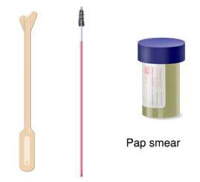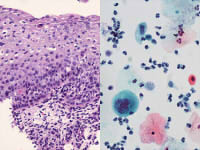| Molecular Diagnosis of Infection > Human Papilloma Virus (HPV) Infection |
Molecular Diagnosis of Human Papilloma Virus (HPV) Infection
| HPV causes cancers. The virus is associated with cervical, vulvar and vaginal cancer in females, penile cancer in males, and anal, oropharyngeal cancer in both sexes. The burden of HPV infection also includes cervical precancers (CDC 2015). But these cancers are easily stoppable by a simple HPV test. HPV DNA testing by PCR has become the standard non-invasive and the only one method for determining the presence of a cervical HPV infection, alongside with the traditional Pap Smear test. |
 |
Cervical Sample for Pap smear & HPV DNA |
The presence of HPV has been implicated in more than 90% of cervical cancers worldwide.
|
|
 |
Liquid cytology Microscopic examination of abnormality |
||
 |
HPV DNA testing in the sample HPV Yes / No ? HPV DNA typing High risk? Low risk? |
||
Ask your health care provider Pap Smear test HPV DNA test Vaccination It is important! |
|||
GenePro Dnagnostic Technology provides the following services: |
|
|
|
Pap smear test can tell cellular abnormality, but it cannot tell if the abnormality is due to HPV infection. In addition, it cannot determine the risk type(s) of the HPV present. |
|
The Test for HPV DNA & Typing by GenePro is simple, fast and cheap, making it a desirable screening test that aims at increased awareness and prevention of an easily preventable cancer. |
|


